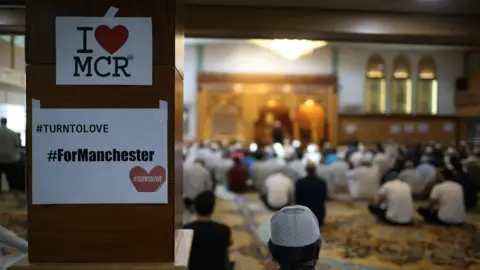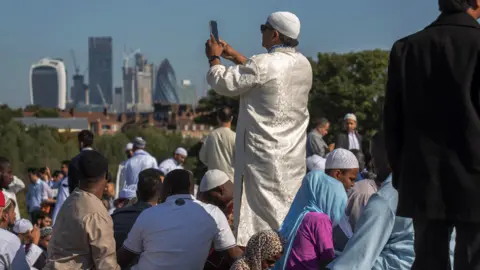Muslim Council of Great Britain campaigns for 'fairer' media coverage
 Getty Images
Getty ImagesThe Muslim Council of Great Britain is to launch a campaign in Parliament for fairer media coverage later.
The council said there was "a serious problem" with the way the UK media reported on Islam and Muslims.
It looked at more than 10,000 articles and TV clips from the last three months of 2018, and said 59% of print articles linked Muslims with negative behaviour.
The study was not open to academic scrutiny but its methodology was analysed by a linguistics analyst.
It covered most major national titles and news television programmes, plus TV drama.
 Getty Images
Getty ImagesPress regulator Ipso is hoping to publish new guidelines on reporting Islam in the UK in the autumn.
The Muslim Council of Britain's newly-formed Centre for Media Monitoring (CfMM) will present its findings in Parliament on Tuesday. The council represents the interests of Muslims in Britain.
The study suggested Daily Mail Australia (the Mail Online's Australia edition) had the "highest proportion of articles" analysed as being "very biased" (37%), followed by Christian Today (35%) and the Spectator (29%). Mail Online, Christian Today and the Spectator have all been contacted for a response.
British regional coverage was found to be "significantly more supportive" than national coverage. The study also said TV fared better than print, but suggested that 43% of broadcast clips associated Muslims with negative behaviour.
BBC drama Bodyguard was among the shows criticised by the report's authors. They said the programme "pandered to stereotypes of Muslim women who wear the hijab as oppressed or subservient". The BBC has been contacted for a response.
The report's co-author Faisal Hanif said it was the first in a series of quarterly studies that he hoped would "serve as a valuable resource for journalists and editors alike".
The findings are not dissimilar to those published in 2008 by three academics from Cardiff University's School of Journalism, Media and Cultural Studies.
They said news stories about Muslims increased dramatically over the period between 2000 and 2008, partly fuelled by the terror attacks in New York in 2001 and London in 2005, but also as a product of a wider preoccupation with Islam and British society.
The researchers found that the majority of the coverage of British Muslims in the British press tended to focus on a narrow range of issues and recurrent, negative types of characterisation.
One of the academics, Kerry Moore, told the BBC such reporting was designed to be "divisive" and was "both unjust and harmful".
A more recent study into the media and Muslims in the UK by the University of Leeds analysed several British newspapers between October and December 2011.
They highlighted incidences of "Islamophobia" in some newspapers, but also found more "positive moves" to counteract "negative constructs and anti-Muslim representations".
The Muslim Council of Britain describes itself as "the UK's largest and most diverse national representative Muslim umbrella body with over 500 affiliated national, regional and local organisations, mosques, charities and schools".

Follow us on Facebook, on Twitter @BBCNewsEnts, or on Instagram at bbcnewsents. If you have a story suggestion email [email protected].
